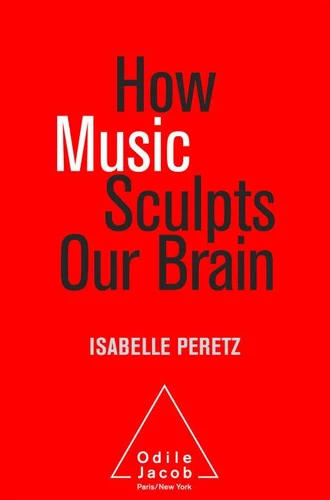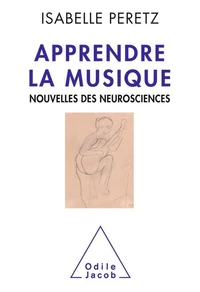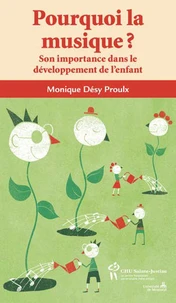How Music Sculpts Our Brain
Par :Formats :
Disponible dans votre compte client Decitre ou Furet du Nord dès validation de votre commande. Le format ePub est :
- Compatible avec une lecture sur My Vivlio (smartphone, tablette, ordinateur)
- Compatible avec une lecture sur liseuses Vivlio
- Pour les liseuses autres que Vivlio, vous devez utiliser le logiciel Adobe Digital Edition. Non compatible avec la lecture sur les liseuses Kindle, Remarkable et Sony
 , qui est-ce ?
, qui est-ce ?Notre partenaire de plateforme de lecture numérique où vous retrouverez l'ensemble de vos ebooks gratuitement
Pour en savoir plus sur nos ebooks, consultez notre aide en ligne ici
- FormatePub
- ISBN978-2-7381-5113-1
- EAN9782738151131
- Date de parution30/03/2023
- Protection num.Digital Watermarking
- Infos supplémentairesepub
- ÉditeurOdile Jacob
Résumé
How does the process of learning music impact our brain? To what extent does it foster curiosity, attention and enhance memory? How is it linked with reading, learning languages, or mathematical thinking? Does a child need a musical ear to develop musical ability and make progress in music? Is there an age limit for learning music? At a time when music education is being drastically cut, in connection with a "back to basics" rhetoric spreading over the field of education, there is also a growing interest in demonstrating and experiencing the way music can boost literacy, fine motor skills, memory, but also social behavior, altruism and.
happiness! A world-renowned expert on music and the brain, Isabelle Peretz takes up the joint challenge of enlightening us on the main findings of more than thirty years of neurobiological research on music and education, and translating them, where possible, into actionable recommendations directly applicable to the music room. Written in both lively and straightforward language, her book details the various ways in which music can transform our brain, for the better.
It makes the main findings of the neuroscience of music accessible to all those involved in music education -aspiring musicians, professors, learning adults, parents, or educational advisors. An indispensable guide to understanding and promoting best practice in musical education. Dr Isabelle Peretz is a professor of Psychology at University of Montréal, where she holds a Canada Research Chair and a Casavant Chair in neurocognition of music.
happiness! A world-renowned expert on music and the brain, Isabelle Peretz takes up the joint challenge of enlightening us on the main findings of more than thirty years of neurobiological research on music and education, and translating them, where possible, into actionable recommendations directly applicable to the music room. Written in both lively and straightforward language, her book details the various ways in which music can transform our brain, for the better.
It makes the main findings of the neuroscience of music accessible to all those involved in music education -aspiring musicians, professors, learning adults, parents, or educational advisors. An indispensable guide to understanding and promoting best practice in musical education. Dr Isabelle Peretz is a professor of Psychology at University of Montréal, where she holds a Canada Research Chair and a Casavant Chair in neurocognition of music.
How does the process of learning music impact our brain? To what extent does it foster curiosity, attention and enhance memory? How is it linked with reading, learning languages, or mathematical thinking? Does a child need a musical ear to develop musical ability and make progress in music? Is there an age limit for learning music? At a time when music education is being drastically cut, in connection with a "back to basics" rhetoric spreading over the field of education, there is also a growing interest in demonstrating and experiencing the way music can boost literacy, fine motor skills, memory, but also social behavior, altruism and.
happiness! A world-renowned expert on music and the brain, Isabelle Peretz takes up the joint challenge of enlightening us on the main findings of more than thirty years of neurobiological research on music and education, and translating them, where possible, into actionable recommendations directly applicable to the music room. Written in both lively and straightforward language, her book details the various ways in which music can transform our brain, for the better.
It makes the main findings of the neuroscience of music accessible to all those involved in music education -aspiring musicians, professors, learning adults, parents, or educational advisors. An indispensable guide to understanding and promoting best practice in musical education. Dr Isabelle Peretz is a professor of Psychology at University of Montréal, where she holds a Canada Research Chair and a Casavant Chair in neurocognition of music.
happiness! A world-renowned expert on music and the brain, Isabelle Peretz takes up the joint challenge of enlightening us on the main findings of more than thirty years of neurobiological research on music and education, and translating them, where possible, into actionable recommendations directly applicable to the music room. Written in both lively and straightforward language, her book details the various ways in which music can transform our brain, for the better.
It makes the main findings of the neuroscience of music accessible to all those involved in music education -aspiring musicians, professors, learning adults, parents, or educational advisors. An indispensable guide to understanding and promoting best practice in musical education. Dr Isabelle Peretz is a professor of Psychology at University of Montréal, where she holds a Canada Research Chair and a Casavant Chair in neurocognition of music.









